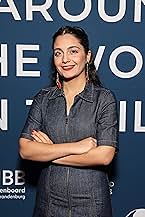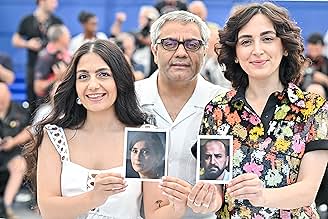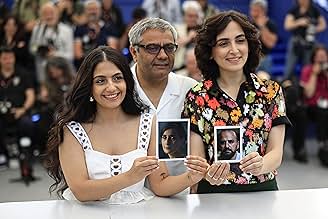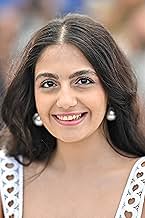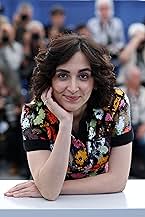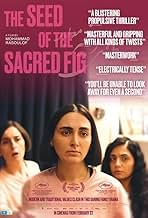Nell'agitazione di Teheran, il giudice paranoico Iman impone severe regole a moglie e figlie dopo aver perso la pistola, mettendo a dura prova i legami familiari mentre la società crolla.Nell'agitazione di Teheran, il giudice paranoico Iman impone severe regole a moglie e figlie dopo aver perso la pistola, mettendo a dura prova i legami familiari mentre la società crolla.Nell'agitazione di Teheran, il giudice paranoico Iman impone severe regole a moglie e figlie dopo aver perso la pistola, mettendo a dura prova i legami familiari mentre la società crolla.
- Regia
- Sceneggiatura
- Star
- Candidato a 1 Oscar
- 36 vittorie e 71 candidature totali
Recensioni in evidenza
The sacred fig is also the strangler fig. It nuzzles its host even as it strangles them to death. The criminal is not the one you expect.
Iman is climbing the ladder in Iran's judicial system. High minded, ambitious, and hard-working, he strives to earn the approval of his superiors and is promoted. Expecting adulation, Iman encounters rebellion instead. Where he presumes love in his workplace, country, wife and daughters, he finds insurgence. If Iman looks inside himself, he might find a way to set things right.
The Seed of the Sacred Fig won two prizes at the Cannes film festival and succeeds because of its authenticity, depth, capable actors, and riveting story. Director Mohammad Rasoulof spent time in prison for the crime of practicing his art of filmmaking. Rasoulof appeared via video at this Toronto International Film Festival screening to tell the story of one of his interrogators who felt shame at his actions and didn't know in what direction to turn. He claimed to be getting grief from his family. This interrogator is the model for the character of Iman.
This raw and unsettling film features actual footage from the violent 2022 uprising in Iran over the death of 22-year-old Mahsa Amini, who was taken into custody for allegedly wearing her hijab improperly. The film reminds us to take a close look at our workplace, country, friends, family, and selves in order not to become a host for any strangler figs, no matter how sacred they claim to be.
Iman is climbing the ladder in Iran's judicial system. High minded, ambitious, and hard-working, he strives to earn the approval of his superiors and is promoted. Expecting adulation, Iman encounters rebellion instead. Where he presumes love in his workplace, country, wife and daughters, he finds insurgence. If Iman looks inside himself, he might find a way to set things right.
The Seed of the Sacred Fig won two prizes at the Cannes film festival and succeeds because of its authenticity, depth, capable actors, and riveting story. Director Mohammad Rasoulof spent time in prison for the crime of practicing his art of filmmaking. Rasoulof appeared via video at this Toronto International Film Festival screening to tell the story of one of his interrogators who felt shame at his actions and didn't know in what direction to turn. He claimed to be getting grief from his family. This interrogator is the model for the character of Iman.
This raw and unsettling film features actual footage from the violent 2022 uprising in Iran over the death of 22-year-old Mahsa Amini, who was taken into custody for allegedly wearing her hijab improperly. The film reminds us to take a close look at our workplace, country, friends, family, and selves in order not to become a host for any strangler figs, no matter how sacred they claim to be.
Many of us know about the recent protests in Iran and the tragic death of Mahsa Amini in 2022. The hijab is mandatory in Iran and is enforced by over zealous religious police. Outside of Iran it is hard to understand that something that seems trivial to us is such a big issue.
This film works because it takes us inside a family unit that is impacted by these very issues. It appears to use actual protest footage ( suitably obscured) mixed in along with the fictional actors. This gives it a more urgent edge.
The husband works as an investigator for the regime. One step away from being a judge. He is under severe pressure at work to process huge numbers of religious "crimes" without any due process. He is finding out that the price of his promotion is blind obedience.
He has two daughters. One at high school and the other at university (college.) One of the daughters has a friend who is shot after being in a crowd near a protest. We are told she was an innocent bystander.
The mum of the family is very concerned to protect the family status and reputation which will see them get a bigger apartment to live in. However this won't happen unless all aspects of life are squeaky clean. They can't even tell the daughters what the Dad does because it is a security risk.
In one of the first shots of the movie we see bullets being handed over to the Dad along with a pistol. He is being promoted but needs to be able to protect himself.
What we are seeing is an actual literal Chekhov's Gun in the story. A concept you can look up :)
The pistol disappears from the apartment and the dad must find it or face a possible jail sentence for its loss. This ramps up the tension a few levels and the film then somewhat devolves from then on.
The main impact from the film is to personalise the various political pressures on each member of the family. The best art takes us beyond the headlines to show us what is happening and how that looks and feels in real life.
The story is a fiction but feels like a documentary in many respects. As a film it is a success in helping us to empathise with real people caught up in this kind of terror.
I saw this film at a festival. There were some scenes that were unwatchable and quite emotional.
It is now coming up to the 2 year anniversary of that wave of protests. It wasn't just one person who has died in the protests. Records indicate the number is approaching 500 and the ripple waves of anxiety and stress in families can only be approximated but this film goes a fair way to doing just that.
This film works because it takes us inside a family unit that is impacted by these very issues. It appears to use actual protest footage ( suitably obscured) mixed in along with the fictional actors. This gives it a more urgent edge.
The husband works as an investigator for the regime. One step away from being a judge. He is under severe pressure at work to process huge numbers of religious "crimes" without any due process. He is finding out that the price of his promotion is blind obedience.
He has two daughters. One at high school and the other at university (college.) One of the daughters has a friend who is shot after being in a crowd near a protest. We are told she was an innocent bystander.
The mum of the family is very concerned to protect the family status and reputation which will see them get a bigger apartment to live in. However this won't happen unless all aspects of life are squeaky clean. They can't even tell the daughters what the Dad does because it is a security risk.
In one of the first shots of the movie we see bullets being handed over to the Dad along with a pistol. He is being promoted but needs to be able to protect himself.
What we are seeing is an actual literal Chekhov's Gun in the story. A concept you can look up :)
The pistol disappears from the apartment and the dad must find it or face a possible jail sentence for its loss. This ramps up the tension a few levels and the film then somewhat devolves from then on.
The main impact from the film is to personalise the various political pressures on each member of the family. The best art takes us beyond the headlines to show us what is happening and how that looks and feels in real life.
The story is a fiction but feels like a documentary in many respects. As a film it is a success in helping us to empathise with real people caught up in this kind of terror.
I saw this film at a festival. There were some scenes that were unwatchable and quite emotional.
It is now coming up to the 2 year anniversary of that wave of protests. It wasn't just one person who has died in the protests. Records indicate the number is approaching 500 and the ripple waves of anxiety and stress in families can only be approximated but this film goes a fair way to doing just that.
There are still places on this Earth where women risk death for committing the irremissible crime of bareheadedness; of not wearing enough fabric to God's supposed liking. Such was the case of Mahsa Amini, the Iranian woman who died in the hospital (from "unrelated causes", as the sorts of people we see in this film would try to tell us -- and themselves) after being arrested for not wearing her hijab in public, escalating the ongoing Girls of Enghelab protests to the point of major unrest that lasted from September of 2022 and all the way into the spring of 2023.
In The Seed of the Sacred Fig, directed by Mohammad Rasoulof (the Iranian filmmaker who has often found himself at odds with his government and currently resides in exile in Germany), the events are seen from the perspective of the family of an investigating judge in Tehran. Throughout the film, real TikTok and Instagram videos of the bedlam are interwoven with the narrative. The unrest is reflected in this family; the daughters question the authorities and traditions that their parents protect for little reason other than tradition itself -- and yes, a point of violence is reached.
This is a tense, atmospheric, moving film. I don't wish to reveal too much about it, but I will say this: if this film becomes as big and impactful as it ought to be, its recurring phrase "I won't sit" may get co-opted by many equal rights/freedom movements to come.
Many Oscar opinion-havers this season have quipped, "I don't care who wins; I just need Emilia Pérez to lose". This concerns all categories that it's (somehow) nominated within, including Best International Feature Film. I guess I don't care who wins either. But it should be The Seed of the Sacred Fig.
In The Seed of the Sacred Fig, directed by Mohammad Rasoulof (the Iranian filmmaker who has often found himself at odds with his government and currently resides in exile in Germany), the events are seen from the perspective of the family of an investigating judge in Tehran. Throughout the film, real TikTok and Instagram videos of the bedlam are interwoven with the narrative. The unrest is reflected in this family; the daughters question the authorities and traditions that their parents protect for little reason other than tradition itself -- and yes, a point of violence is reached.
This is a tense, atmospheric, moving film. I don't wish to reveal too much about it, but I will say this: if this film becomes as big and impactful as it ought to be, its recurring phrase "I won't sit" may get co-opted by many equal rights/freedom movements to come.
Many Oscar opinion-havers this season have quipped, "I don't care who wins; I just need Emilia Pérez to lose". This concerns all categories that it's (somehow) nominated within, including Best International Feature Film. I guess I don't care who wins either. But it should be The Seed of the Sacred Fig.
To better understand the concept behind the film, this might help, learn where the name of the film comes from:
There are plants known as "strangler figs" that exhibit strange behavior. Strangler figs (genus *Ficus*) begin their life as seeds deposited on the branches of a host tree, typically by birds or other animals. The seeds germinate and send down roots that eventually reach the ground. As the roots grow and thicken, they encircle the host tree, creating a lattice-like structure.
Over time, the strangler fig's roots and branches grow larger and more robust, competing with the host tree for sunlight and nutrients. Eventually, the fig's growth can become so extensive that it constricts the host tree's trunk, restricting its ability to transport water and nutrients. This process can lead to the host tree's death, effectively allowing the strangler fig to take over the space and resources previously used by the host.
The strangler fig does not immediately kill the host tree but rather slowly overcomes it through a combination of physical encasement and competition for resources. This fascinating but destructive relationship highlights a unique strategy in the plant kingdom for survival and growth.
Over time, the strangler fig's roots and branches grow larger and more robust, competing with the host tree for sunlight and nutrients. Eventually, the fig's growth can become so extensive that it constricts the host tree's trunk, restricting its ability to transport water and nutrients. This process can lead to the host tree's death, effectively allowing the strangler fig to take over the space and resources previously used by the host.
The strangler fig does not immediately kill the host tree but rather slowly overcomes it through a combination of physical encasement and competition for resources. This fascinating but destructive relationship highlights a unique strategy in the plant kingdom for survival and growth.
The movie "The Seed of the Sacred Fig" is a political thriller centered on Iman, who is searching for a promotion in Tehran's judicial system. As he ascends in his career, he is torn between personal and professional conflicts, facing moral dilemmas within his family amid the upheaval of the 2022-2023 Iran protests.
The movie is captivating for its portrayal of the clash between an archaic, sexist, and oppressive government driven by religious ideals and the freedom of expression, culture, and modern values embraced by the younger generation. This duality extends into the family dynamic, where personal beliefs collide with political pressures, creating a powerful internal conflict.
Director and writer Mohammad Rasoulof delivers an emotional movie by blending real footage of student protests following the death of Mahsa Amini in 2022.
Another standout achievement is the title The Seed of the Sacred Fig, which perfectly captures and summarizes the essence of the movie. It's a perfect and beautiful choice that sums up the story beautifully.
The movie is captivating for its portrayal of the clash between an archaic, sexist, and oppressive government driven by religious ideals and the freedom of expression, culture, and modern values embraced by the younger generation. This duality extends into the family dynamic, where personal beliefs collide with political pressures, creating a powerful internal conflict.
Director and writer Mohammad Rasoulof delivers an emotional movie by blending real footage of student protests following the death of Mahsa Amini in 2022.
Another standout achievement is the title The Seed of the Sacred Fig, which perfectly captures and summarizes the essence of the movie. It's a perfect and beautiful choice that sums up the story beautifully.
Lo sapevi?
- QuizDirector Mohammad Rasoulof was originally scheduled to take part in the 2023 Cannes Film Festival as a jury member of the Un Certain Regard section. However, he was arrested in July 2022 after criticising the government's crackdown on protestors in the southwestern city of Abadan in Iran over deadly building collapse. On May 8, 2024, Rasouloff's lawyer announced that he has been sentenced to eight years in prison as well as flogging, a fine and confiscation of his property. On May 12, 2024, Rasouloff announced that he managed to flee Iran and was staying at an undisclosed location in Europe. On May 24, 2024, Rasouloff attended the film's premiere in Cannes and on the red carpet he held up photos of two of the film's actors, Soheila Golestani and Missagh Zareh.
- Curiosità sui creditiOpening credits: "Ficus Religiosa is a tree with an unusual life cycle. It seeds, contained in bird droppings, fall on other trees. Aerial roots spring up and grow down to the floor. Then, the branches wrap around the host tree and strangle it. Finally, the sacred fig stands on its own."
- ConnessioniFeatured in 82nd Golden Globe Awards (2025)
I più visti
Accedi per valutare e creare un elenco di titoli salvati per ottenere consigli personalizzati
Dettagli
Botteghino
- Lordo Stati Uniti e Canada
- 860.139 USD
- Fine settimana di apertura Stati Uniti e Canada
- 35.230 USD
- 1 dic 2024
- Lordo in tutto il mondo
- 6.589.827 USD
- Tempo di esecuzione
- 2h 47min(167 min)
- Colore
- Mix di suoni
- Proporzioni
- 2.35 : 1
Contribuisci a questa pagina
Suggerisci una modifica o aggiungi i contenuti mancanti



